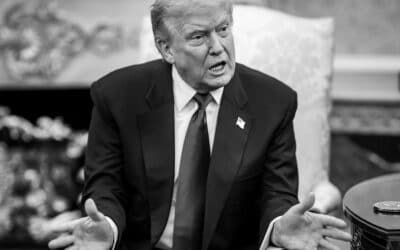Almost four years of Democrats and liberal mainstream pundits hysterically blaming President Trump’s 2016 victory on Russia has done enormous damage to U.S. political discourse. Besides the immense danger of ramping up tensions with another major nuclear power, Russiagate has also influenced Republicans and right-wingers to use the same tactic to bash Trump’s opponent for 2020, and ramp up tensions with another nuclear power—China.
Of course, Russiagate would not be possible without help from the intelligence agencies who feed news outlets flimsy claims about Russian meddling and produce reports and assessment on the topic. Both sides were handed a gift last week when National Counterintelligence and Security Center Director William Evanina released a statement that said the Intelligence Community assessed that Russia is hoping Donald Trump is reelected, and China and Iran prefer a Joe Biden victory in November.
“We assess that Russia is using a range of measures to primarily denigrate former Vice President Biden and what it sees as an anti-Russia ‘establishment,’” the statement reads. The only example Evanina uses in the statement is the fact that Moscow and pro-Russian Ukrainian lawmakers have criticized Biden for his role in the 2014 coup in Ukraine, and the corruption that followed, which are entirely legitimate grievances.
Concerning Beijing, Evanina’s assessment says, “We assess that China prefers that President Trump—whom Beijing sees as unpredictable—does not win reelection. China has been expanding its influence efforts ahead of November 2020 to shape the policy environment in the United States, pressure political figures it views as opposed to China’s interests, and deflect and counter-criticism of China.” The statement lists things China has criticized the Trump administrations for, like its actions in Hong Kong, the South China Sea, and more, all areas where the administration has been extremely aggressive.
Evanina’s statement also warns of Iran, and says the Islamic Republic “seeks to undermine U.S. democratic institutions.” The statement says Iran’s efforts “probably will focus on on-line influence, such as spreading disinformation on social media and recirculating anti-U.S. content.” It is no surprise that Iran would prefer a Biden victory in November since the Trump administration has been incredibly hawkish towards the country. And Biden was part of the administration that negotiated the 2015 nuclear deal, a deal Trump scrapped when he reimposed crippling sanctions on Iran in 2018. But there is no indication that Iran is working to “undermine” democratic institutions in the U.S., which is demonstrated by Evanina’s lack of evidence for the claim, and the inclusion of the word “probably.”
Ultimately, this assessment is a whole lot of nothing. But not surprisingly, Russiagaters jumped on the statement and twisted it to fit their narrative.
Writing in The Washington Post, Jennifer Rubin insisted that while Evanina’s statement mentioned China and Iran, their influence was nothing compared to big bad Russia. Rubin said the inclusion of China and Iran in the assessment “seemed to be a transparent political effort” to level the playing field for Trump. “Only one power is engaged in ongoing actions to influence the election, and that is for the benefit of one candidate, Trump,” Rubin wrote.
When discussing the new intelligence, Speaker of the House Nancy Pelosi took the same line as Rubin and said Russian and Chinese interference are not equal. “Russia is actively 24/7 interfering in our election. They did so in 2016, and they are doing so now,” Pelosi said. “The Chinese, they said, prefer Biden—we don’t know that, but that’s what they’re saying, but they’re not really getting involved in the presidential election.”
While Pelosi, Rubin, and the entire Democratic establishment still peddle Russiagate, the narrative has entirely collapsed. The conspiracy that the Trump campaign colluded with Moscow fell apart with the release of the Mueller report. More recently, it was revealed by declassified House testimony from 2017 that the private cyber-security firm CrowdStrike had no proof that Russia hacked the DNC and liberated the emails that were published by WikiLeaks.
But these facts do not stop Pelosi and her ilk from framing every move Trump makes as a “gift” to Russian President Vladimir Putin, no matter how hawkish his actual policies are towards Russia. For example, the recent announcement by the administration that 12,000 U.S. troops are being pulled out of Germany was framed in the same fashion, with CNN saying the pullout might be Trump’s “last gift to Putin before the election.” This analysis ignores the fact that about half of the troops leaving Germany are being moved to Poland and the Baltic states, closer to Russia’s border. “We are moving many troops further east, closer to Russia’s border, to deter them,” Secretary of Defense Mark Esper said in a recent interview.
While the Democrats try to downplay China’s role in election interference, the Trump administration is trying to hype it up. On Sunday, in an interview with CBS, National Security Advisor Robert O’Brien said Chinese hackers have attacked election infrastructure. “They’d like to see the President lose,” O’Brien said. “China—like Russia, like Iran—they’ve engaged in cyberattacks and phishing and that sort of thing with respect to our election infrastructure, with respect to websites and that sort of thing.”
O’Brien’s claims sound familiar. Russia was accused of hacking election infrastructure in 2016. The allegation originally came from the Department of Homeland Security (DHS) and was later included in a Senate Intelligence report that said Russia targeted the electoral websites of about 21 states. The report explains how only one of the 21 state websites was actually penetrated by a hacker, and the others were only scanned and probed.
After the DHS announced that they notified 21 states of Russian hacking that allegedly took place during the 2016 election, interviews with state officials in The Washington Post revealed these types of intrusions happen all the time. An official from Oregon said her team blocks “upwards of 14 million attempts to access our network every day. These attempts come from all over the world, including Russia, with the largest number from the U.S.”
“This was a scan, and many computer systems are regularly scanned,” a Colorado official said. “It happens hundreds, if not thousands, of times per day.” The one state that was breached was Illinois. Both the Post and the Senate Intelligence report said there was no evidence any votes were altered; only personal information of registered voters was exposed. A DHS official testified before Congress in 2016 and noted that the Illinois hack was “possibly for the purpose of selling personal information,” since the data was stolen and not altered.
As far as attribution, the DHS said they identified where the hacks came from by identifying an IP address, and the Senate Intelligence report said this IP address “provided some indications the activity might be attributable to the Russian government [emphasis added].” Not exactly a slam dunk.
The frequency of these types of scans and attacks and the difficulty of finding out where the hackers are located—let alone if they are state-affiliated—shows O’Brien’s statement about China attacking election infrastructure does not carry much weight.
Playing into the narrative that China wants to see a Biden presidency, President Trump said on Tuesday that if he loses, China will “own” the U.S. “If I don’t win the election, China will own the United States — you will have to learn to speak Chinese,” Trump told radio host Hugh Hewitt. Trump’s top donors also like to accuse Biden of being China’s favorite candidate. A major pro-Trump Super PAC, America First Action, funds the website Beijingbiden.com, a site dedicated to attacking the former vice president for his “weak stance” on China.
While the president did not exactly accuse China of interfering in the election, it is an accusation he’s hurled at Beijing in the past. “Regrettably, we found that China has been attempting to interfere in our upcoming 2018 election, coming up in November,” Trump told the UN Security Council ahead of the 2018 midterm elections, offering no evidence for the claim.
The Biden campaign seems to be just as hawkish on China as they are on Russia. The coronavirus pandemic has caused the Trump administration to sharply increase hostile rhetoric towards China, with the president and many officials accusing Beijing of a “cover-up.” But according to the Biden campaign, Trump has not been tough enough on China. The campaign released an ad in April that said Trump “rolled over for the Chinese” and praised China too often at the beginning of the outbreak. “Trump praised the Chinese 15 times in January and February as the coronavirus spread across the world,” the ad said.
Andrew Bates, a Biden campaign official, had harsh words for Trump in response to the president’s recent comments about Americans “speaking Chinese” if Biden wins in November. “Trump has been the weakest president in American history with respect to China. As the most devastating public health crisis in 100 years rapidly spread, he echoed Chinese Communist Party propaganda to downplay the threat and justify inaction,” Bates told Business Insider.
In recent months, the Trump administration has acted against Beijing in all different arenas, sinking U.S.-China relations to possibly their lowest point since Richard Nixon’s trip to the Asian country in 1972. The administration has sanctioned Chinese officials over Hong Kong and Xinjiang, formally rejected China’s claims to the South China Sea, signed orders to ban Chinese-owned apps TikTok and WeChat, and sent a U.S. official to Taiwan in the highest-level visit to the island since 1979. Along with the change in policy towards the South China Sea, the U.S. has drastically increased its military presence in the waters, sending two aircraft carriers to the region and breaking records for the number of military flights near China’s coast in July.
This idea that Trump has been the “weakest president” in history on China coming from the Biden campaign ignores these enormous provocations, the same way Russiagate forces many to ignore the administration’s frequent provocations towards Moscow. If both sides are willing to out hawk each other on China and Russia, the intelligence agencies will happily play along and provide ammunition in the form of dubiously sourced assessments. It is not clear if we will see a Biden victory or a Trump victory this November, but either way, it will be a win for the War Party and the new Cold Warriors in Washington.
Dave DeCamp is the assistant news editor of Antiwar.com and is based in Brooklyn, NY. Follow him on Twitter @decampdave. This article was originally featured at Antiwar.com and is republished with permission.































